how to have a good time in a phd
not real advice
Decide, on day zero, that you are going to have a good time. That you are going to make it so. Your twenties are happening, after all. In first year fall, time your departures from the office to coincide with sunset — early, in the winter, so if it’s too early then take a break to watch the show, floor to ceiling windows, steps from your desk. Think continuously about the meta project of academic research. “What it is I think I’m doing anyhow.”1 How frequently, how oddly, advice for aspiring writers sounds more or less like advice for young researchers. “If you want something, do what it takes to get it.”2
Keep track of what you’ve done for work every day in your notes app. A bulleted list, “- emails, - prepared for XX meeting, - read section 3 of XX, - went to XX’s talk, - thought about XX problem.” A little trail of pebbles as proof to yourself that you actually did something with your time, that you have not been completely helpless against the days weeks months hurtling through. Spend our days, spend our lives, et cetera.
Come to accept the impossibility of having it all. Interdisciplinary work is hard, this you always knew. There are no shortcuts to expertise in any discipline. (In your first year, make up a thing you call “math happy” and tell everyone you’re not there yet.) Work more closely with more people and realize that everyone is compromising, everyone is giving something up, of course they are, they are only human.
When the opportunity comes to take your writing more seriously, try, for twelve weeks, to do so.3 Realize, bittersweetly, that you can’t. When they say “you can only do 3-4 hours of real creative work a day anyway” — when they cite Simone de Beauvoir, June Huh — they don’t mean to spend the remaining hours of your day on other creative work. Realize that you want your mind’s creative energies, for now, to be on research. “If you decide not to pursue a path, accept your choices.”4
Live in a mild state of denial about not being able to have it all. Sign up for a battery of what you only half-ironically call “enrichment activities.” Ballet, of course. Boxing. Figure skating. Something you are new and bad at. Show up week after week, and trust that showing up is enough — remember all those years of plies and tendus before you understood, actually, how to dance. Remember that progress is essentially a string of failures surprised by success. You haven’t fallen once in a year of lessons which probably means you could push yourself harder, but for what?
At a City Arts lecture Maggie Nelson says something about how, when she was dancing, they were told to leap so high, so far, that they fell. The point being not to fall, but to know just how far you could go without it, to dance at the edge of too much.
You fall a lot, on the other hand, while skiing. Another activity you are bad at. You are never going to be the fastest or the coolest looking skier on the mountain,5 but get good enough to know the thrill. There are lots of ways to get where you need to go, lots of ways to have a great time.
(Think constantly about John’s three types of people who “make it” in grad school. The grinder, the grifter, the one in love with their work. You are, probably, all three.)
After a year and a half of research that you find interesting but perhaps not riveting (or “romantic”), suddenly stumble upon something that you believe in on all fronts. Show up hours late to a party because you wanted to finish a proof, drag your laptop into bed after nearly fainting at the office because at least you can work out the constants in this lemma, it won’t take that much brainpower and you really want to know. Amaze yourself with how much you care. Lock yourself into a room with a collaborator or two and with them, start approaching, to your astonishment, “math happy.” Finally understand the euphoria of discovery, all the pieces clicking into place, and what comes after: the satisfaction of combing through the kinks in a proof, cleaning up notation, all the ways to present an argument. Finally see what people mean when they say “line of work,” see the followup papers — their titles, their abstracts — spooling out into 2025. Love a project maybe a little too much, find your heart broken when a collaborator points out something you had all missed earlier that renders your main result meaningless. You don’t remember when you stopped looking for the sunset every night.
Take a lot of vacation, possibly too much. How much cottony nothing your head can contain, how much nothing you are happy for your head to contain. Back in first year you were transcribing lecture notes on the BART and watching Simons talks while folding laundry. What is burnout, anyway. Spend hours staring out the window, wherever you’re going, and more when you get there — the ocean, the hills, the mountains, the clouds, the ocean, the ocean, the ocean. How much cottony nothing.
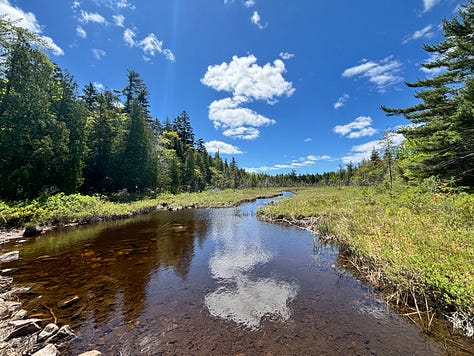

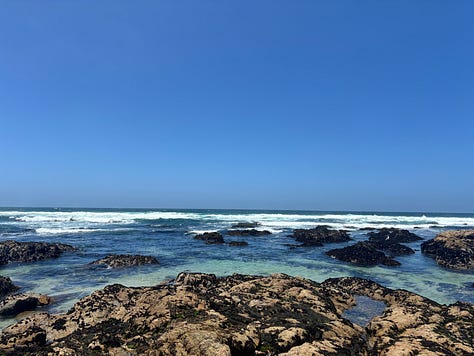

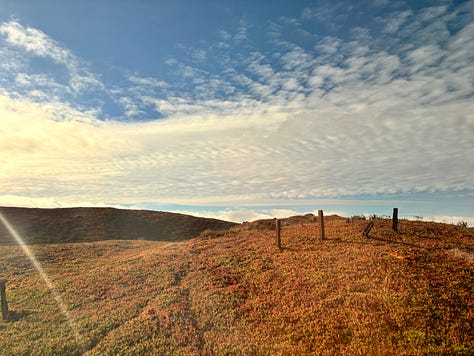
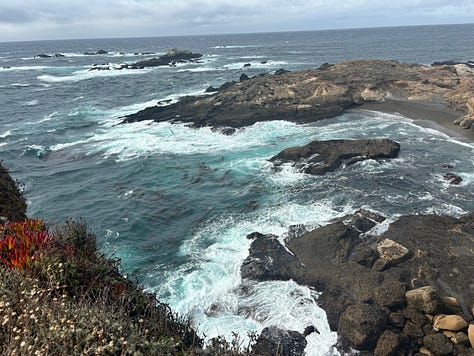
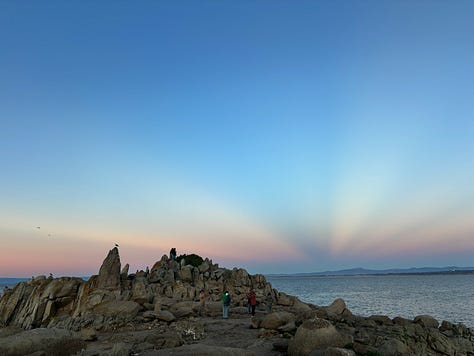
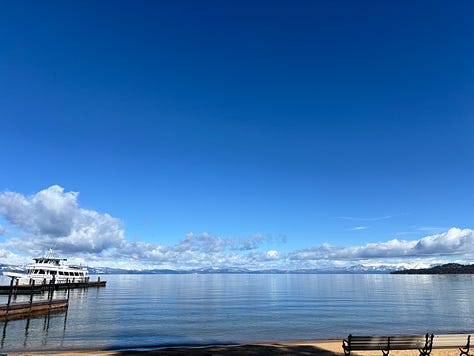
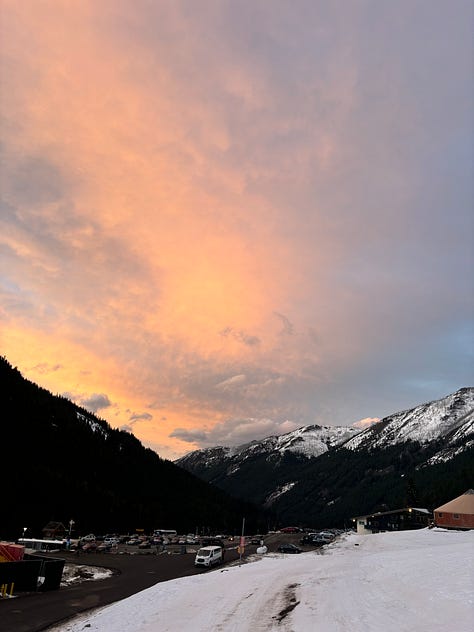
The last few days, Nutcracker season, that G major scale has been playing in my head pretty much nonstop. You’ll know it when you hear it, the Sugar Plum pas de deux, descending, again and again. Its inevitability, the surety and the stability of the bottom, the triumph of the high G emerging once more. I never notice the last run has passed until it’s over, and pressing replay isn’t ever quite the same as arriving the first time. But there will be another Nutcracker, and when Nutcracker season is over there will be another one of those, too, and I am by no means a Nutcracker die-hard but that scale — in a few weeks I’ll forget it but eleven months from now it’ll be back.
And every day the sun sets, it does, no matter who sees.
Hopefully this goes without saying but I am very very aware that Step 0 to all of this is having excellent advisors and friends and collaborators and so on. To all of whom I am endlessly grateful!
Art highlights of 2024
The Visitors at SF MOMA (it’s still open!) — spellbinding
Joffrey’s Anna Karenina — Amanda Assucena an incredible Anna, and Yumi Kanazawa such a sparkling Kitty.
Parsons at the Joyce, again lol. (If anyone wants to sponsor a late May NYC trip so I can see them a fourth time… let me know.)
“An artist and her network” — an exhibit on Broncia Koller-Pinell at the Belvedere. I don’t know much about art history to be honest but I loved this “old masters” style portrait of her.
Faure’s Requiem (someone yelled “pay your chorus!” during the standing ovation) and Hélène Grimaud playing Ravel (that second movement….!)
Best fiction was Martyr! by Kaveh Akbar and Beautyland by Marie Helene Bertino, but I need to stop (accidentally, I swear) reading novels about main characters who are writers.
Art lowlights of 2024
Mere Mortals at SFB (show me a piece of good art about AI that’s not Ishiguro, you can’t).
A bizarre jazz violin/piano show where we were the youngest in the room by ~40 years and the violin was … not good
Do not get me started on the Musikverein tourist trap!!!!
Title of an essay by Toni Cade Bambara - somehow the best PDF I could find was from this person's are.na
But so much love and respect for Kearny Street. I learned so much from everyone and one day hope to be half as cool as any of you.
Also from that CRAFT TALK post.


wow, this is beautiful. and oh man, i feel this -- "You don’t remember when you stopped looking for the sunset every night."
Dang gonna get tickets for parsons whoa